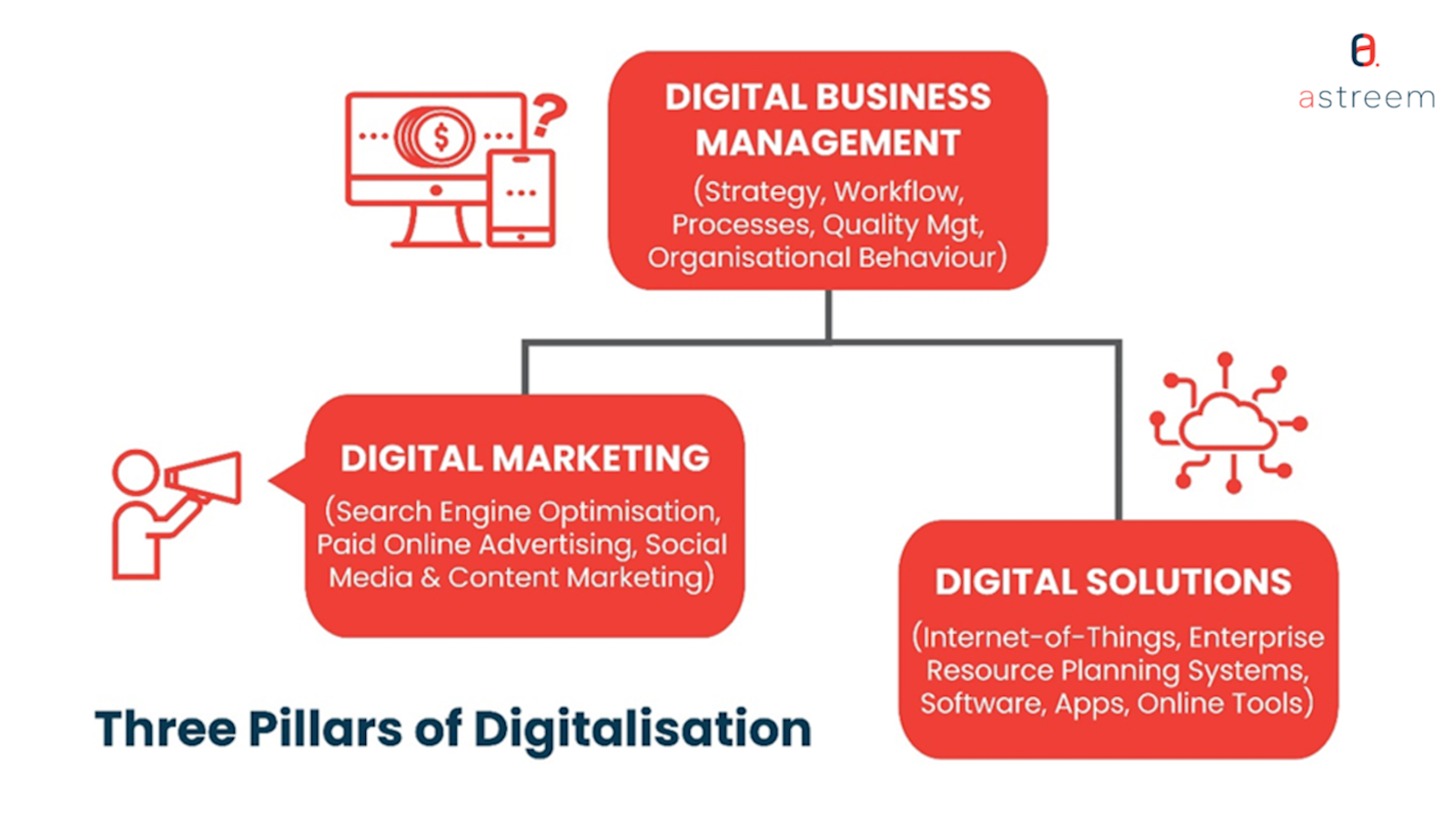TECHNOLOGY |
Digital Business Management: The First Step To Digitalize Your Business
Written by Yash Patil, Digital Marketing Strategist, Astreem Consulting
Digitalization has been a buzzword among the business community and government agencies for the past decade. Increased global connectivity and the Internet has spurred digitalization efforts due to lower costs and the availability of digital solutions. The COVID-19 pandemic has accelerated digitalization as businesses were forced to improve, modify, or completely change their processes and operations to remain in business during the lockdowns. Even with COVID-19 moving into an endemic phase, the business landscape has forever changed. In order to digitalize your business, the first step is to assess, identify and develop a digital roadmap.

What Is Digitalization?
Digitalization is about employing digital technology to improve a business model or process and create new revenue sources. In short, digitalization or digital transformation, is about transforming businesses from a traditional model to a digital model to achieve better business outcomes.
Digital transformation transverses all businesses, from sole proprietors to Small & Medium Enterprises (SME) to Multi-national Corporations (MNC). It can be as simple as food service kiosk operators accepting digital payments to an MNC revamping their Enterprise Resource Planning (ERP) system.
In Singapore, the government is a strong proponent of digitalization and aggressively supports the enterprises to digitally transform, including pledging to invest more in the digital frameworks of the future. Today, about 83% of local businesses have some digital transformation plans in place. However, 54% have experienced a delay in the implementation due to the pandemic. On the regional level, ASEAN leaders have also outlined four broad strategies to accelerate inclusive digital transformation.
3 Pillars Of Digitalization
While you must be aware of the need to digitalize your business, you must know how to go about digitally transforming your organization. One useful framework that can be used to understand the essential process of digitalization is the “Three Pillars of Digitalization”. This practical framework outlines the three core components of digitalization and the order they should be implemented. The three pillars are: Digital Business Management, Digital Marketing and Digital Solutions.
Most businesses are familiar with digital marketing and digital solutions. The former encompasses online marketing strategies and tactics to promote a brand and acquire customers. Digital solutions are tools that use digital technology to help improve or transform a business process. The solutions include stand-alone software, apps, or a full Customer Relationship Management (CRM) system. However, the most important pillar of digitalization, and ironically often overlooked, is digital business management.

Digital Business Management
Digital business management refers to undertaking all aspects of managing a business in the digital era. It covers understanding all stages in the business management process from strategic planning, organisational behaviour, workflow, operations, training, data-sharing to finance. Business owners must identify and map out business processes that will benefit from digitalization. The goal of digital transformation is to improve productivity and efficiency while reducing costs and human error.
Digital business management is the logical first step in digital transformation as it provides the roadmap for the rest of the digitalization process. Before engaging in digital marketing and investing in digital solutions, businesses must have a clear digital business management strategy and plan for their business.
For SMEs, digital business management aims to evaluate business processes, workflows and operations and identify issues or bottlenecks. These issues can be present in operations, internal communication, quality management, data collection, marketing or resource planning. When issues are identified, a business processes transformation plan can be implemented, along with choosing the right digital solutions needed to support digitalization.
The Digital Business Management Process
Step 1: Business Process Audit
This essential first step involves auditing your existing business processes through process mapping with key departments and stakeholders. This includes assessing procedures, standards and controls against their strategic performance objectives and identifying areas with potential efficiency or electiveness gains.
Step 2: Business Process Re-engineering
Based on the business process audit, key business processes must be redesigned to eliminate unproductive activities and focus on procedural efficacy. This helps the organization realize value gains in costs, quality, efficiency, or effectiveness.
Step 3: Digital Solution Implementation
Only after auditing and re-engineering business processes can an organization determine what digital solutions you should adopt and invest in. Digital solutions refer to IT solutions, software, apps, or online platforms that transform legacy business processes. They are designed to tackle problems in simple, efficient, innovative, and scalable ways. The digital solution must serve the business, not the other way around.
Step 4: Training
Functionality training sessions must be conducted for key stakeholders and employees to equip them on how to use the digital solution that supports the re-engineered business processes. Assessments must be conducted after every training session to confirm that training had been effective and knowledge transfer is achieved.
Managing Change In Digital Business Management
One of the most challenging issues to digitalise your business is managing the internal change brought about by digitalization. A change in business processes requires clear communication to employees about the benefits of the change and how the changes will take place.
The transition process involves:
- Managing the resistance to change in the working process due to digitization.
- Training the employees with new digital skills.
- Assuring the employees of their jobs upon retraining.
- Monitoring the results when implementing the new digital solutions.
- The goal is to manage the concerns and expectations of employees of all levels as the company moves forward with digital transformation.
The Need To Digitalize Your Business
As COVID-19 continues and the world tries to adjust to endemic living, digitalization is becoming increasingly important. The pandemic caused a dramatic shift in the way people communicate, work, buy and sell. Even when the pandemic is entirely over, the world will not go back to “normal”.
Industry experts today have suggested that the new normal in 2025 will be more tech-driven and that businesses will be more reliant on digital tools. McKinsey foresees that in the new normal, the recovery will be digital as digitization is now seen as a norm across industries. Organizations will need to increase competitiveness by improving efficiency, productivity, and quality through digitalizing business processes. There is an urgent need for businesses with legacy processes to explore digital business management.
Astreem Can Help Your Business With Digital Transformation
At Astreem, we create growth strategies with partners ready to scale. We’re a team of strategists, innovators and problem solvers ready to increase your brand equity and digitize for scalability across Southeast Asia and beyond.
This article was first seen at https://www.astreem.com/digital-business-management-the-first-step-to-digitalise-your-business-in-singapore.
You Might Also Like

TECHNOLOGY | 9 June 2024
Franchise Evaluation Tools by Top Franchise Asia: A Comprehensive Guide
Aspiring franchisees often face difficulties in determining which franchise opportunity is the best fit for them. The decision-making process involves a deep dive into various aspects of a franchise,

TECHNOLOGY | 28 September 2022
8 Steps To Better Operational Audits
Audits are only useful when designed correctly, easily implemented and provide insights to help managers make decisions.

TECHNOLOGY | 15 September 2022
Automating Workflows To Increase Productivity And Accuracy
In our new digital world, manual workflows and checklists are now elevated to digital versions that can be highly automated to reduce implementation repetition, save time and reduce human errors.
Latest on TFA

EXPLORE | 31 January 2026
Japanese Dining Continues to Dominate: EN Group Eyes the Philippines for Its Next Growth Chapter
Japanese cuisine has evolved from a niche international offering into one of the most resilient and preferred dining categories in the Philippines.

SUCCESS | 20 November 2025
Omoté: Singapore’s Beloved Modern Japanese Eatery Lands in the Philippines
Omoté has long been one of Singapore’s most beloved modern Japanese dining spots, well-known for its generous chirashi bowls, progressive Japanese flavors, and its philosophy of serving quality food a

SPOTLIGHT | 14 November 2025
From a Small Dream to a Big Movement: The Story Behind Smashed
Some brands start with capital. Others start with credentials. Smashed started with heart.